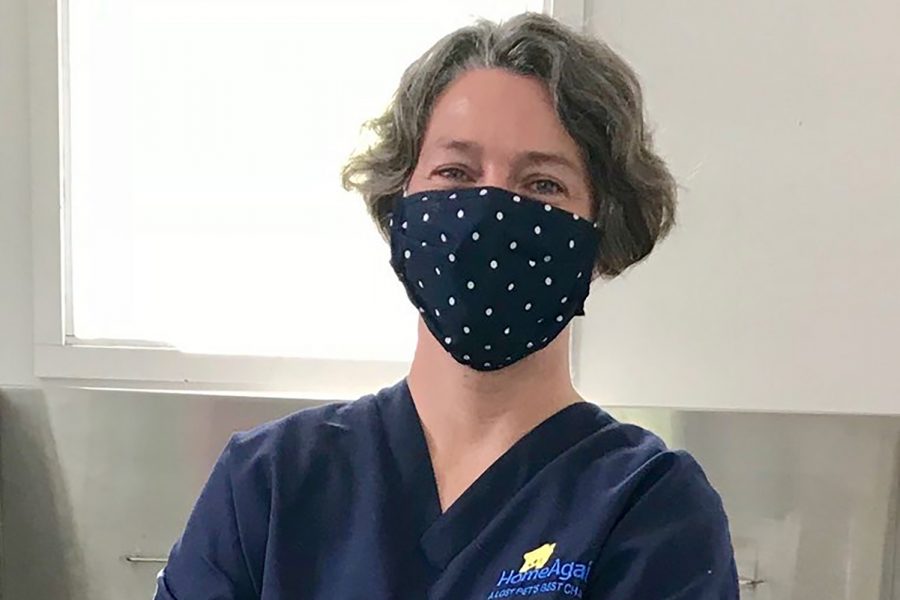University of Iowa Public Health Experts say repeat cases of COVID-19 are a possibility
While experts are uncertain over the exact chances of contracting the novel coronavirus for a second time, they warn it will be similar to other ailments like the cold and flu. As there is no immunity guaranteed, continuing to follow safety guidelines should remain a priority for those who have already recovered from COVID-19.
October 13, 2020
When University of Iowa sophomore Grace Clesle tested positive for COVID-19 at the start of the school year, her symptoms included one-day fever, cold-like symptoms, fatigue, and an insatiable hunger.
A month after completing her quarantine and returning to campus, Clesle said she is still confused about the possible long-term effects of the virus and any chance that she can catch it again.
“I know I can get it again,” Clesle said. “But I feel like the percentage … is a lot smaller to get it for a second time than it was for getting it for the first time.”
Clesle is one of more than 2,000 UI students who have tested positive for COVID-19 since the semester began. While the likelihood of contracting the virus again remains uncertain, medical experts recommend that those who’ve already had the virus continue social distancing and mask-wearing.
RELATED: Students headed home from the UI may risk spreading COVID-19 to family members
University of Iowa Hospitals and Clinics hospital epidemiologist Jorge Salinas said it is possible to contract COVID-19 for a second time.
“There are now a dozen or so publications or reports — people that get COVID develop immunity to COVID, but not a lifelong immunity,” Salinas said. “That immunity is presumed or expected to last a few months or maybe a year, and of course it’s variable.”
Salinas said UIHC has not seen any patients with a confirmed second case yet, but the virus is still new – not even a year old – so it will become clearer as time goes on.
“It’s similar to the common cold that is also caused by a coronavirus,” Salinas said. “We do develop immunity, but after a few months or years we can get the common cold again.”
Each case of COVID-19 is different, Salinas said, so symptoms vary for repeat cases. He added that someone would be just as contagious the second time around.
“It’s hard to predict, and there have been some reports of milder cases and some reports of worse cases,” Salinas said.
The CDC’s three-month guideline is a combination of both how long immunity might last, and how long people could still test positive from contracting the virus the first time, Salinas said.
“Normally people have immunity for a period of time,” Salinas said. “It can be probably more than three months, so three months was just an average that they chose. Also, because many people – 50 percent of people – remain positive at one month and still a smaller proportion remain positive at two-three months.”
Salinas said the trade-off between those two factors is how the CDC landed on the 90-day standard.
“I think it’s reasonable to think that if somebody develops respiratory symptoms a second time within those 90 days, chances are that it is something else — common cold, influenza, another respiratory virus instead of COVID,” Salinas said.
Once a vaccine is distributed, people who already had COVID-19 should still be vaccinated and it will hopefully provide a longer-lasting immunity, Salinas said.
RELATED: COVID-19 imposes challenges on University of Iowa language courses
People who contract COVID-19 should follow guidelines and recommendations — especially avoiding large indoor crowds — even during the three months right after they contracted the virus, he added.
“It’s important for all of us to follow the same recommendations,” Salinas said. “The better we work together as a pack, everybody doing the exact same thing, the better the implementation of these public health measures.”
UI Department of Epidemiology Professor Christine Petersen said there is no solid evidence that individuals can contract COVID-19 a second time in the short term.
“It can happen in years,” Petersen said. “You can get sick, it’s going to be like the flu, so you can get sick this year and then get sick next year, but you wouldn’t say ‘I got reinfected.’”
Petersen said she hopes that wearing masks and following guidelines will be a sign of solidarity from people who have recovered from the coronavirus. Petersen said neither she nor her colleague Mike Pentella, professor of epidemiology at the UI, were aware of any repeat cases at the UI or across the state.
Three months seems to be the average length of antibodies staying in the system, she said, but antibodies are not necessarily equivalent to immunity.
“What we don’t know — when you get an infection again, your immune response has seen it before so it will respond faster and better,” Petersen said. “So, we don’t know if that second time you would actually even get sick and that really differs from person to person.”







